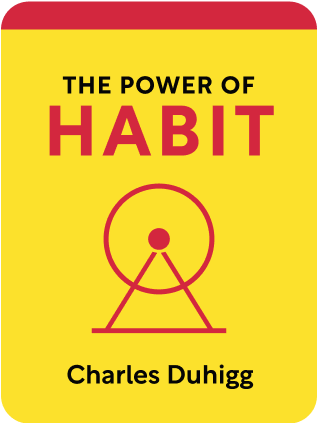

This article is an excerpt from the Shortform book guide to "The Power of Habit" by Charles Duhigg. Shortform has the world's best summaries and analyses of books you should be reading.
Like this article? Sign up for a free trial here .
What exactly is a habit? Why are habits important?
A habit is an action repeated over time until it becomes automatic. Habits influence everything—from our purchasing decisions to social movements.
Continue reading to learn why habits are so important and influential.
How Advertisers Exploit Your Habits
Why are habits important? Well, according to Duhigg in the book The Power of Habit, advertisers deliberately play on your brain’s reliance on automatic routines to influence your shopping decisions. They know that you’re more likely to buy things that you’re familiar with to avoid making conscious decisions every time you go shopping (because your brain wants to conserve energy.) This is why they try so hard to figure out your preferences—for example, by tracking website cookies when you shop online or your reward cards when you shop offline. These methods allow them to send you customized deals that appeal to your predictable nature and get you back in their stores.
(Shortform note: Psychologists warn that your brain’s tendency to operate in autopilot mode when shopping may save you time but it doesn’t save you money. Retailers manipulate their environments to accommodate your habitual purchases and trick you into making impulsive and unnecessary buying decisions. Research indicates that you’re more likely to make impulsive purchases when you shop without a list, walk through more aisles, feel hungry, or when your store rearranges its layout (which they deliberately do periodically). Psychologists recommend that you write a shopping list and go straight for these items to avoid falling into the trap of making impulsive purchases.)
The Influence of Collective Habits
According to Duhigg, businesses and communities rely on automatic routines just as much as you do to save time and energy. However, what’s interesting here is that, by their nature, these entities rely on the collective habits of multiple people to determine how they operate. We’ll explore this further throughout the rest of this section.
How Habits Impact Businesses
Duhigg argues that businesses rely on automatic routines so that managers and employees can get things done without having to question every action they take. However, many of these collective habits grow organically from an accumulation of individual decisions taken by different managers and employees. Over time, the company loses track of the individual decisions that initiated the habits that are now deeply ingrained in the company’s culture. As a result, they end up acting out these automatic routines without knowing why. New employees quickly adopt these habits to fit in, and the cycle of automatic routines perpetuates.
Duhigg argues that, when a company is unaware of the automatic routines that underpin its organization, it can easily fall into the trap of adopting deconstructive habits that undermine its operations.
| Businesses Fail to Align Collective Habits With Their Overall Goals Management experts explain that many organizations fail to take control of their collective habits because they assume that what worked historically to bring them success will continue to work in the future. However, this strategy falls short because business priorities—the goals that determine what types of customers the business serves and how it intends to provide value—evolve over time, and the collective habits they rely on must adapt, too. Experts argue that businesses must continually assess whether their collective habits support their overall priorities, and take the necessary steps to align employee behaviors with the organization’s goals. However, they warn that managers and employees tend to resist change for the same reasons that they develop habits in the first place: to save mental energy. Learning to do things differently increases the amount of effort that they need to apply to carry out their daily tasks and often creates resentment. Organizations can help smooth the transition to new collective habits by ensuring that managers and employees understand why they need to change their behaviors. |
How Habits Impact Communities and Societies
Duhigg argues that every major movement that has impacted communities and societies has been fueled by a particular type of habit: social habits. These habits define how you relate to and behave around other people. According to Duhigg, social habits influence the way you identify with and act on the information you’re exposed to.
(Shortform note: Research backs up Duhigg’s claim that the choices you make about the movements you support are influenced by social habits. While you may think that your opinions about all of the issues you hear about are solely your own, social psychologists confirm that your perceptions and behaviors are heavily influenced by other people. You think a lot about other people, allow them to impact your emotions, and feel motivated to adapt your behaviors to please others. Consequently, the movements you choose to follow are an extension of this social influence.)
Duhigg explains that successful social movements rely on social habits in three ways:
1) The movement begins with the social habits of close friends: Someone is afflicted, and the people close to them immediately help.
(Shortform note: While taking action to help a friend in need feels like a natural and selfless response, James Clear (Atomic Habits) argues that your underlying motivation to belong affects all of your behaviors, including this one. He claims that there are three groups of people that greatly influence how you respond to situations: the close (family and friends), the many (the general public), and the powerful (the people you perceive as successful.)
2) The movement grows from the habits of a community: The social ties that combine loosely affiliated people create social pressure to join the cause.
(Shortform note: In How Behavior Spreads, behavioral expert Damon Centola explains that you’re more influenced by the percentage of people that are doing something, rather than the total number. If a high percentage of people in your community support a cause, you’ll naturally feel like it’s the right thing to do.)
3) The movement endures because the participants engage in new social habits: The participants identify with the movement and take on habits that reflect their belief in the cause.
(Shortform note: While Duhigg focuses on the endurance of movements due to participants engaging in new social habits, he doesn’t mention another vital factor: Eventually, collective individual habits influence business habits, making these new habits even more visible and accessible to potential participants. For example, when animal rights activists decided to become vegetarians, stores and restaurants changed their offerings to cater to this demand. This visible change brought vegetarianism to the attention of shoppers, some of whom then adopted the cause.)

———End of Preview———
Like what you just read? Read the rest of the world's best book summary and analysis of Charles Duhigg's "The Power of Habit" at Shortform .
Here's what you'll find in our full The Power of Habit summary :
- The 3 steps to change your habits
- Why habits are at the root of success in football
- How social movements are just an expansion of habits from individuals to communities






